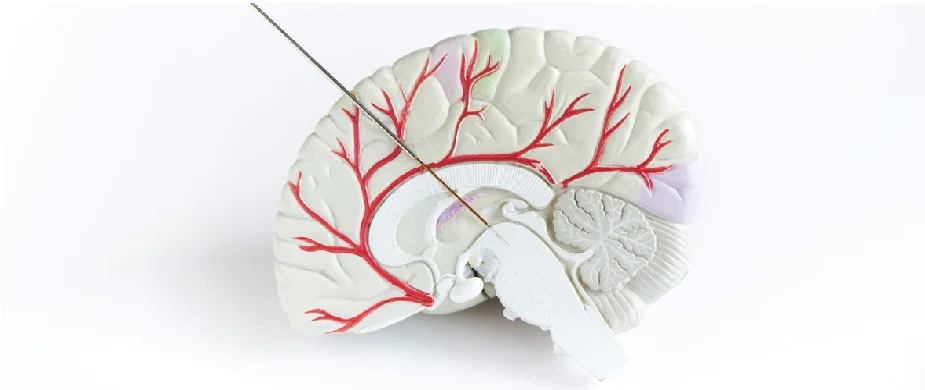
Book an Appointment
Call Us09958011121Stroke Prevention & Management: Key Strategies for Better Health
At IBS Hospital, we not only focus on treating complex neurological conditions; but also aim at raising awareness about their prevention and management. Stroke is one such condition that requires prompt medical intervention. Although it is both preventable and manageable, many people have to lose their battle against it due to a lack of awareness. In this blog, we have elaborated on various prevention and management strategies that can help to protect you and your loved ones from the debilitating impact of stroke, with the help of experts specializing in Brain Stroke Treatment in Delhi.
What is a Stroke?
A stroke is a medical emergency that occurs when there is a sudden interruption in the blood supply to the brain. It is a leading cause of disability and death worldwide, making it imperative for individuals to educate themselves and seek relevant information. According to the World Health Organization (WHO), each year, approximately 15 million people worldwide suffer from stroke. Out of these, about 5 million lose their battle against it, and another 5 million are left with permanent disabilities.
There are several risk factors that can put an individual at risk of developing a stroke. Best Stroke treatment specialists suggest that by learning about these risk factors and identifying them at the earliest, we can take proactive steps to bring down the risks of stroke.
Also Raed: Stop a Stroke Before It Starts: Key Tips for Stroke Prevention
Prevention: Knowledge is Power
Awareness is a powerful tool in the fight against strokes. Understanding the warning signs and symptoms of a stroke can lead to early detection and treatment. Common symptoms include sudden numbness or weakness in the face, arm, or leg, especially on one side of the body; confusion; trouble speaking or understanding speech; vision disturbances; dizziness; and severe headaches with no apparent cause. If you or someone around you experiences these symptoms, it is crucial to seek immediate medical attention. You can find the best Neurology Specialists in Delhi at IBS Hospitals, who are available 24x7 to handle such cases.
Treatment and Management
Stroke treatment primarily depends on the type of stroke and how quickly medical intervention is sought.
- Ischemic Stroke Treatment: Ischemic strokes occur when a blood clot blocks a blood vessel supplying blood to the brain. The main goal in treating ischemic strokes is to quickly restore blood flow to the affected area of the brain. Treatment options include Intravenous Thrombolytic Therapy (IV tPA), Endovascular Thrombectomy, Antiplatelet and Anticoagulant Medications.
- Hemorrhagic Stroke Treatment: Hemorrhagic Stroke occurs when a blood vessel ruptures, causing bleeding within or around the brain. Treatment aims to stop the bleeding, reduce pressure on the brain, and control factors that may contribute to bleeding. Treatment options include Surgical Interventions, Blood Pressure Management, and Supportive Care.
Also Read: The Ultimate Guide On How To Prevent Stroke: Lifestyle Changes And Tips
Recovery and Rehabilitation
Regardless of the type of stroke, rehabilitation is a vital part of the recovery process. Stroke survivors may experience physical, cognitive, and emotional challenges. Rehabilitation programs, including physical therapy, occupational therapy, and speech therapy, are essential to help patients regain independence, relearn skills, and improve their quality of life.
Prevention:
Adopting a healthy lifestyle that includes regular exercise, a balanced diet, managing chronic conditions (e.g., hypertension, diabetes), refraining from smoking, and limiting alcohol consumption can significantly reduce the risk of stroke. It is crucial to remember that stroke is a medical emergency, and seeking immediate medical attention is vital to minimize potential damage and improve outcomes. As per the best neurology doctor in Delhi, early intervention can make a significant difference in the treatment and recovery process.
The sooner a stroke is diagnosed and treated, the better the chances of recovery and minimizing potential long-term disabilities. Hence, the acronym "FAST" can serve as a helpful reminder for stroke recognition:
F - Face drooping: Is there a noticeable droop on one side of the face?
A - Arm weakness: Is one arm weaker or more difficult to raise than the other?
S - Speech difficulties: Is the person having trouble speaking or slurring their words?
T - Time to call emergency services: If any of these signs are present, call for medical assistance immediately.
By raising awareness, we can significantly reduce the burden of stroke on individuals, families, and society. To know more, you can consult the best Stroke Treatment Specialist at IBS Hospital.
 By -Dr Aaksha Shukla |
January 18, 2024 | 9 Min Read
By -Dr Aaksha Shukla |
January 18, 2024 | 9 Min Read
Parkinson’s Disease Treatment Hospital in India
Brain Stroke Treatment Hospital – Emergency Care
Stroke Paralysis Treatment Hospital – Advanced Neuro Care
Paralysis Treatment Hospital in India – Cost & Recovery
Brain Infection Symptoms, Causes, and When to Seek Emergency Care
Is Spine Surgery Right for You? Here’s How to Know
Brain Health at Every Age: Preventive Neurology Tips
International Patient Guide: Visiting India for Neuro & Spine Treatments
Robot-Assisted & Navigation-Guided Surgery: Safer Brain & Spine Procedures
Sports Injury Recovery: How Arthroscopy Helps You Heal Faster?
How Deep Brain Stimulation (DBS) Helps in Parkinson’s & Tremor Control
Early Warning Signs of a Brain Tumour & When to See a Neurosurgeon
Signs of a Stroke: When to Seek Emergency Neuro Care
Best Neurosurgery Hospitals in Delhi NCR: A Detailed Guide
Minimally Invasive Spine Surgery: Benefits, Cost & Recovery
Best Tips for Sports Injury Recovery
Guide to Stroke Prevention and Recovery
How to Manage Parkinson’s Symptoms Effectively

